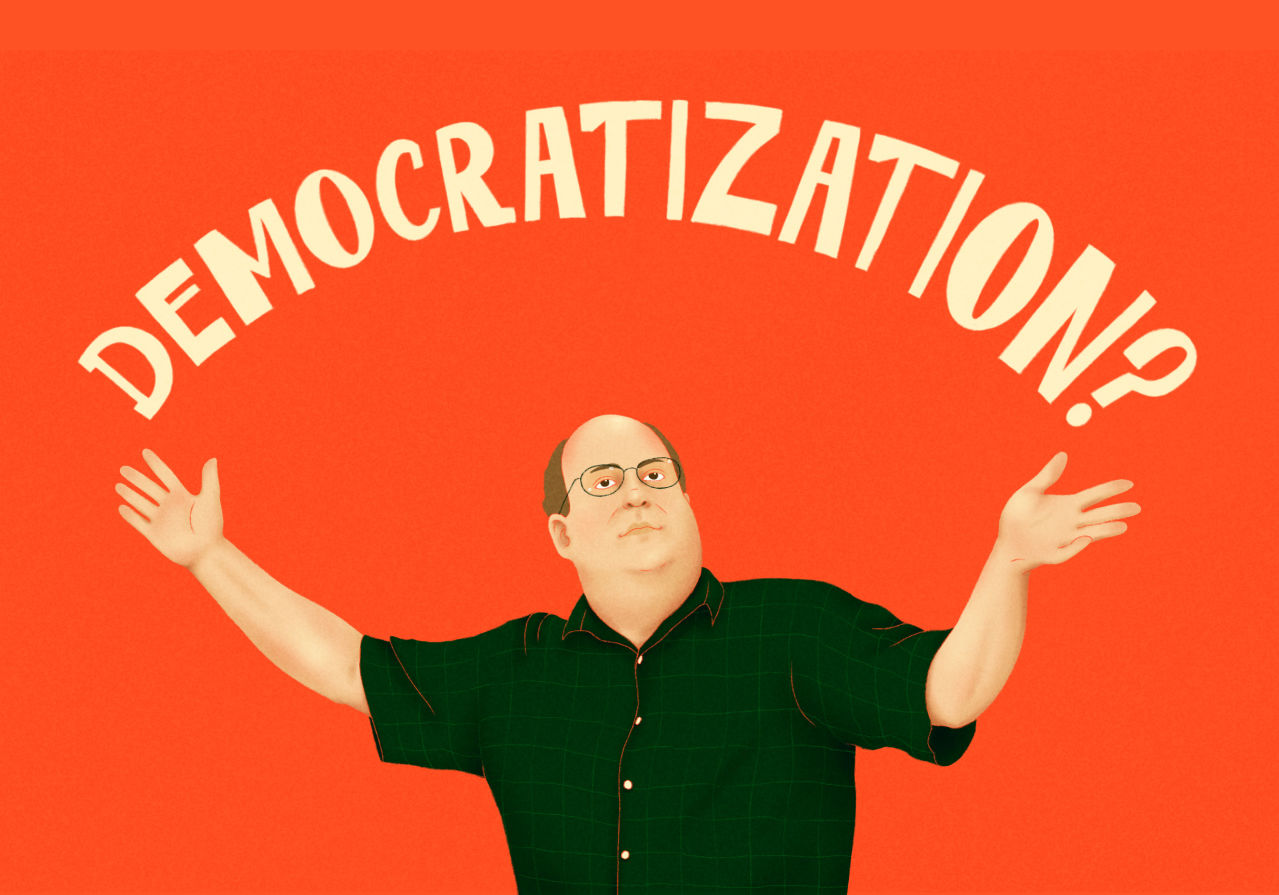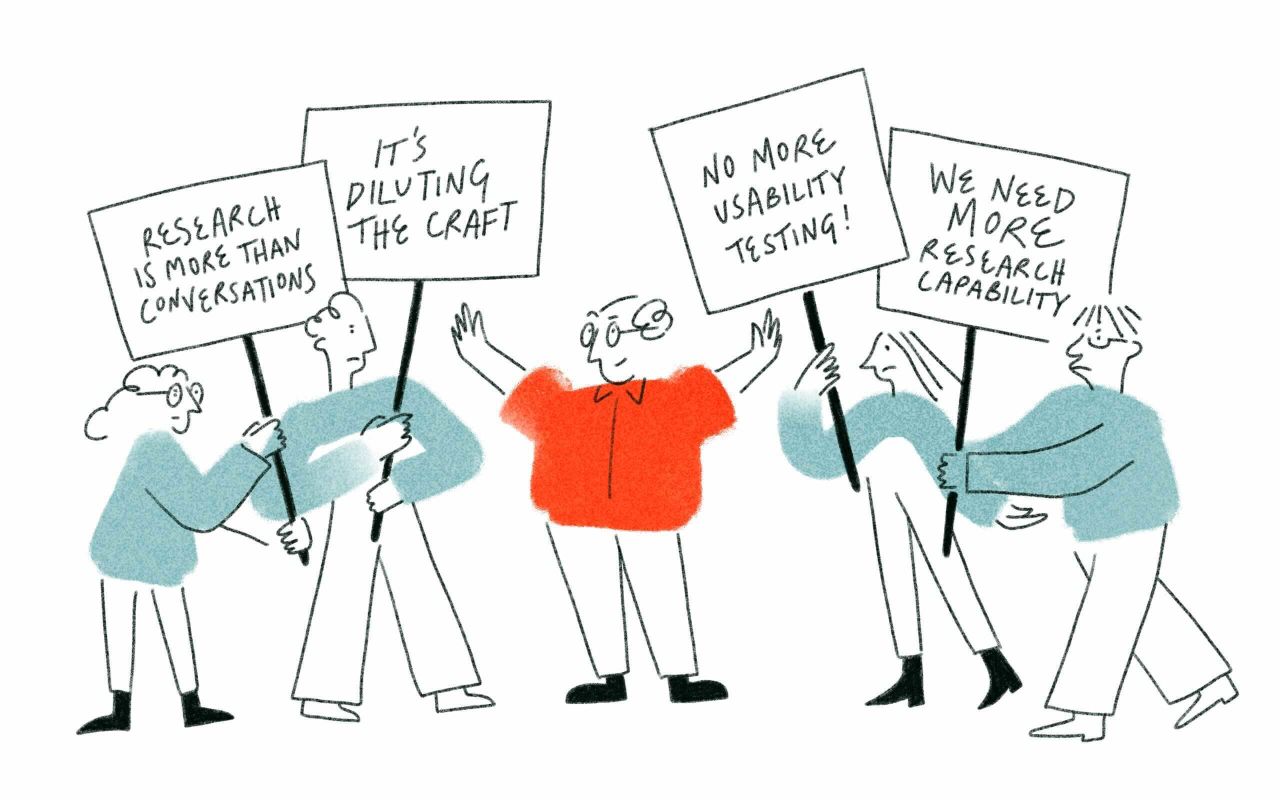Tell us what you really think: Jared Spool on democratizing research

Jared Spool by Tia Alisha
“Democratizing is such a funny word.”
Jared Spool, legendary researcher, designer, author, educator, and usability guru, is on a roll.
We’re discussing a thorny concept: The democratization of research—a nebulous, poorly defined term that often provokes polarizing reactions from the research community. Spool is not a fan.
“When people cook for themselves, is that democratizing restaurants?” asks Spool, a wry grin spreading across his cheeks. In the research community and beyond, Spool’s ideas are well known. Perhaps less well-known is his penchant for witty analogies. Before the end of our conversation, he’ll pepper me with some more. But not before he takes his shot at a few sacred cows.
“To me, this democratizing trend is a statement of arrogance,” says Spool. “It has the air of ‘letting the peons do the work that I do.’” As he says this, Spool does what appears to be an impersonation of a feudal lord. He apologizes for the poor impersonation before launching back into his point. “It’s the phrase researchers use to give permission to people who they otherwise didn’t want to give permission to. ‘Yes, yes. We will democratize this. We will carve out small pieces and let you do your thing.’”
I’m taken slightly aback by Spool’s take on democratization. Not in a bad way. It’s refreshing. But the perspectives on democratization usually fall into two camps. Camp one believes democratization dilutes the craft and unfairly treats research as a set of activities rather than a profession. This group is decidedly anti-democratization of research. Camp two believes democratization is the way forward for research. By offloading more routine research activities like evaluative testing to stakeholders, camp two argues researchers can focus on more strategic, high-impact activities. This group is pro-democratization.
Spool is in his own camp—he believes both sides are wrong, and he tells me exactly why. “When we talk about democratizing research, we treat the research as the end goal. It’s not the end goal,” he states bluntly. “Research is a practice we use to get a shared understanding of what the problem is. The democratization movement rarely talks about that. It talks about giving people access to tools that allow them to conduct certain kinds of research,” says Spool.

Camp one or camp two—Jared Spool chooses neither.
The problem with camp two
Spool’s referring to the argument proposed by “camp two.” Their idea is that professional researchers should focus on high-impact research projects while a well-trained apprentice can conduct usability testing activities. Eduardo Gomez Ruiz, Design Lead at Miro, promotes this angle in his UXPlanet article, Scaling UX Research: how to train an army of (non)researchers.
Ruiz’s article provides practical and grounded advice for teams looking to expand their research capacity through democratization. But as Spool suggested, the stated end goal is to have non-researchers pick up a range of skills and conduct research activities—i.e., the research is treated as an end in itself. Carrying out usability testing or crafting simple surveys for feedback would almost certainly bring the team closer to the customer to some extent. But still, Spool argues it isn’t a good use of resources.
“It’s not effective to relegate research to what essentially amounts to QA work—which is important—but should be a small percentage of what’s happening,” says Spool.
“The thing that bothers me about the democratization movement is it’s very much about being a gatekeeper—which is ironic,” says Spool. “Whenever I hear people talk about democratizing research, what they’re really saying is they want people to do the parts of research they don’t like to do and keep the rest of it for themselves.”
Spool then hits me with another analogy. “It’s like having this lovely cow that we’ve butchered, that we�’ll share with you, but we’re going to keep the prime cuts of meat. We’re going to give you the chewy bits. To some extent, that’s what people talk about when they talk about democratization.”
To be clear, Spool isn’t opposed to providing non-researchers with training or that research shouldn’t be everywhere in an organization—he simply doesn’t think the democratization movement advocates for the right things. It puts the research cart before the insights horse.
Spool’s thoughts are mirrored in another UXPlanet article on democratization by Saswati Saha Mitra, a former colleague of Ruiz and current Group Research Leader at WhatsApp. In the piece titled Undemocratising User Research, Saha Mitra provides a sobering case study of the failings of democratization efforts from her time at Uber.
“[Democratization] failed because no matter how much you plan and organize, high-quality insights require much more than a faster insights gathering process,” writes Saha Mitra. “It took more time and effort to deliver than the value it delivered to the organization.”
Herein lies the problem. The effort and resources expended on democratization don’t yield real insight into customer problems. By focusing on the training, frameworks, methodologies, and research outputs, something bigger is missed in the process.
The problem with camp one
As for “camp one,” Spool also dismisses the argument that democratization threatens to dilute the research craft. It’s a common theme that comes up in discussion about democratization and one that’s hinted at in Carol Barnum’s seminal essay on the topic, The State of User Research, Journal of Usability Studies (2019).
Spool points out that doctors don’t mind people putting bandaids on themselves, nor do dentists hate it when you brush your teeth. He hits me with one more analogy. “People don’t stop going to restaurants when they learn how to cook. They appreciate fine cooking even more,” he aptly points out.
“It’s just insecurity speaking. If they were truly good at their craft, they’d be hopelessly transparent about it,” Spool adds.
Is there more to democratization?
To be fair to the democratization concept, it’s often discussed as much more than simply “training an army of non-researchers.” In a previous article, Dovetail’s Product Design Lead Lucy Denton talks about democratization as a cultural shift in an organization led by researchers who educate, inform, and open up the research craft. The goal isn’t to transform stakeholders into apprentice researchers but to guide the entire organization to better customer understanding. The real challenge that democratization seeks to tackle is how you “engage” non-researchers in the research process, and ultimately how you facilitate deeper customer understanding across an organization.
Spool more or less agrees with this perspective but still believes democratization is the “wrong verb.” It focuses on the output—the research—rather than the outcome—deeper customer understanding, he says.
“The ideal outcome would be: I can talk to anybody on the team about some aspect of the user’s experience—frustrating, complicated, convoluted things that are really hard for users to deal with, and everybody has the same understanding of what that is,” says Spool. “Also, hopefully, they have the same vision as to how we’re going to solve that thing and know the baby steps to get there.”
Exposure is everything
What advice does Spool have for researchers looking to guide their organization toward a closer understanding of the customer? It will come as no surprise to anyone who follows Spool, he suggests a concept called “exposure hours.”
“Exposure, in its simplest form, is the amount of time that someone who makes a decision that affects the user’s experience spends with the people who have that experience,” explains Spool. “When companies are really small—like two or three people—they have incredible contact with their customers. But as companies grow, insulation forms between the people who make the most significant decisions and those affected by the decisions—the users and the customers.
Over time, that insulation prevents decision-makers from understanding that the decision they made in the meeting room the other day has this incredible effect on the people who they’re trying to serve,” Spool elaborates. “The more we punch holes in that insulation and get direct exposure between the decision-makers and the folks who are feeling the effects of those decisions, the more we can create a feedback loop that drives better decision-making. And that’s really what we’re talking about: creating that environment where a feedback loop can happen and doing that at scale.”
It’s a familiar point of view at Dovetail—our CEO and Co-founder Benjamin Humphrey talks about the growing insulation between decision-makers and users as a “customer understanding gap.” By making research and insights more accessible to stakeholders, he believes organizations can “punch holes” in the insulation around decision-makers, helping them make better customer-driven decisions.
In a (rather extended) nutshell—that’s Jared Spool’s view on the democratization of research. It’s clear by the end, his aversion to the idea comes down to a framing of the problem, where he believes democratization emphasizes the wrong thing. To conclude, I’ll leave you with one last analogy, courtesy of Spool.
“[Democratizing research is] like saying, we’re not trying to get our errands done, we’re trying to drive today. It’s nice to go for a drive. But what about when you want to go somewhere? It would be nice to know where that place was and how we could get there before we get in the car.”
I told you he liked analogies.